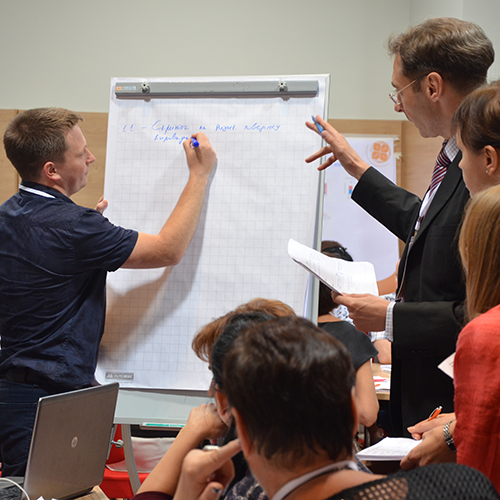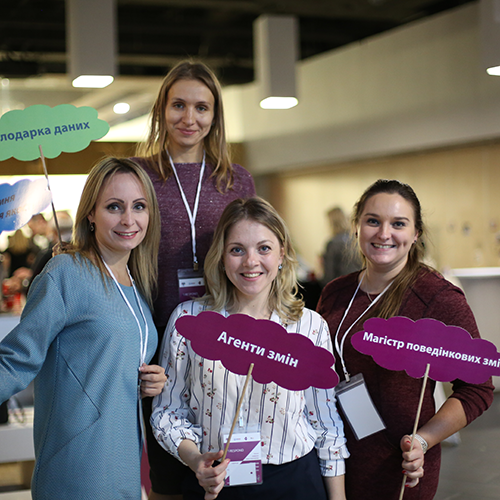Designed by Pact




Робота неурядових організацій в умовах збройного конфлікту
Практичний посібник з безпекових питань містить рекомендації щодо діяльності громадських організацій в Україні під час воєнного стану. Посібник, створений у рамках проєкту “Інновації для подолання епідемії ВІЛ”, містить рекомендації щодо впровадження заходів безпеки, зокрема під час поїздок у місця підвищеного ризику, технології стратегічного планування, проведення організаційної роботи, особливості налагодження зв’язків із військово-цивільними адміністраціями (ВЦА).
Посібник буде корисний як для керівників і працівників неурядових організацій, міжнародних організацій, так і для також усіх зацікавлених у тематиці створення та діяльності громадських організацій в Україні.
DATA FOR DECISION MAKING
Over 100,000 children in Ukraine live in residential care institutions. Only 8% of them are orphans, the rest have one or both parents. The Government of Ukraine has prioritized the De-Institutionalization Reform through the adoption of the National Strategy and the Action Plan to Reform Institutional Childcare System in August 2017. The main goal of the National Strategy is to transform the existing residential care system into a system which ensures the rights of children to be raised in a family environment.
The Children’s Ombudsman Office leads and coordinates implementation of the reform. However, the office has been lacking tools around data analysis to better monitor progress of the reform. Pact has partnered with the Children’s Ombudsman Office to develop a solution to start tackling this issue. Under Ignite Incubator Pact Ukraine team developed PRO-MISE! - an electronic portal designed to monitor the implementation of the child De-Institutionalization Reform.
The Monitoring and Information System portal provides quality data for decision making, user-friendly data visualization, and real-time reporting for abuse cases. Today the portal is formally launched and is available at www.diplatform.org.ua.
A National Strategic Information Portal was developed and launched in collaboration with the Ukrainian Center for Public Health. It combines several interactive online resources related to monitoring and evaluation and strategic information on HIV/AIDS interventions, such as regional profiles, service mapping, a registry of donors and HIV-service organizations, and a compendium of interventions.
PRO-MISE! (CHILD DE-INSTITUTIONALIZATION REFORM PORTAL)
NATIONAL STRATEGIC INFORMATION PORTAL
MEASURING SOCIAL IMPACT
At Pact, we strive to make people’s lives measurably better through programs that improve access to quality health care, build better livelihoods opportunities, and ensure the sustainable use of natural resources. While it is easy to count the number of people who have participated in our programming, it is harder to comprehensively capture the benefits they realize as a result, as well as the relative value of those outcomes in their lives. The Social Return on Investment (SROI) methodology is one way to do this: It is a stakeholder-driven, principles based analytical framework that captures and communicates the value of outcomes, both intended and unintended, for direct participants as well as those who benefit indirectly. Beneficiaries are at the center of this approach and they are asked to describe the outcomes they have experienced and the relative value of those outcomes in their lives. Comparing this value against program inputs (or investment) yields the SROI ratio. The in-depth qualitative feedback gathered during stakeholder consultations is also used to improve programming.
PACT in Ukraine already has the experience of conducting two SROI evaluations:
1. Evaluation study of the “Seven Steps” behavioral intervention for people who inject drugs (based on the results of the assessment, a Certificate was received from the Social Value International organization).
2. Forecast evaluation of the pilot project “Promprylad. Renovation”, a social enterprise in Ivano-Frankivsk (Western Ukraine) set-up revitalize a Soviet-times industrial plant Promprylad, and to convert it into an innovation platform, with new economy, modern art, non-formal education and urban development as pillars.
EVALUATION STUDY OF THE “SEVEN STEPS” BEHAVIORAL INTERVENTION FOR PEOPLE WHO INJECT DRUGS
SOCIAL ENTREPRENEURSHIP ECOSYSTEM
Pact is always looking for innovative ways to improve the capacities of local partner organizations, so they are resilient, and their services are sustainable. In 2015, Pact piloted a program to support a cohort of six Ukrainian HIV-service NGOs in launching social enterprises as part of sustainable resourcing strategy. This unique approach combined elements of human-centered design, business strategy and capacity development, and peer learning.
In April – December 2016, Pact supported a research study aimed at assessing Ukrainian social enterprises and determining their best practices. Building upon this initiative and to explore the social entrepreneurship ecosystem in Ukraine further, in March - June 2018 Pact conducted an Applied Political Economy Analysis (APEA), that included desk research, interviews and focus groups with representatives of three key ecosystem actor segments: social entrepreneurs, funders, incubators/accelerators.
A NEW WAVE.
THE STATE OF SOCIAL ENTERPRISE IN UKRAINE
FROM SOCIAL IDEA TO SUCCESSFUL BUSINESS MODEL.
BUSINESS MODEL VALIDATION WORKSHOP
SNAPSHOT OF SOCIAL ENTREPRENEURSHIP ECOSYSTEM IN UKRAINE
THE SOCIAL ENTREPRENEURSHIP ECOSYSTEM IN UKRAINE: CHALLENGES AND OPPORTUNITIES
